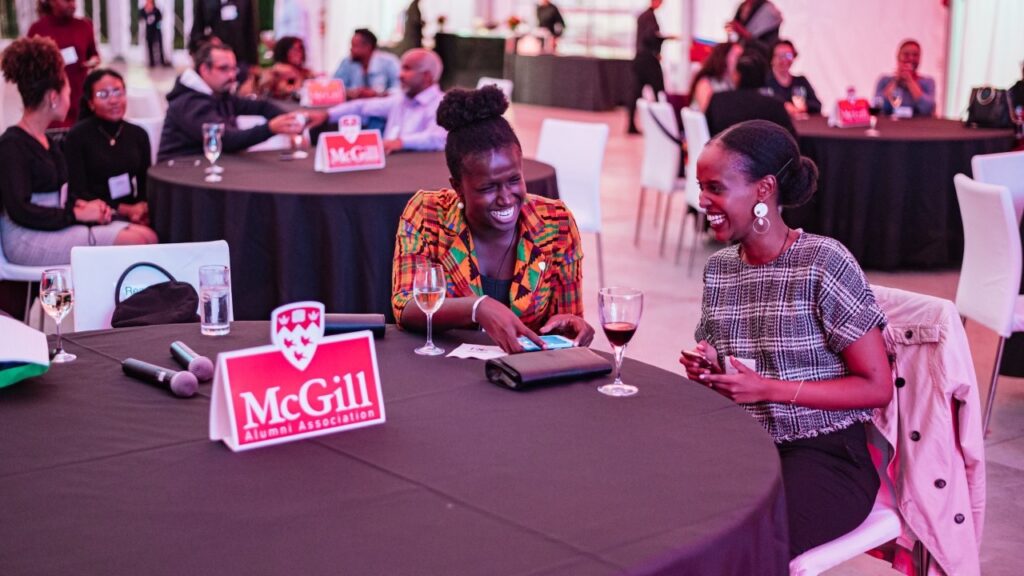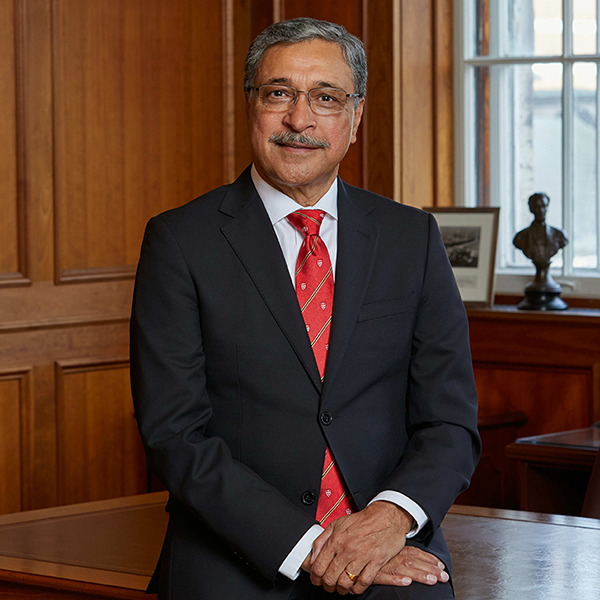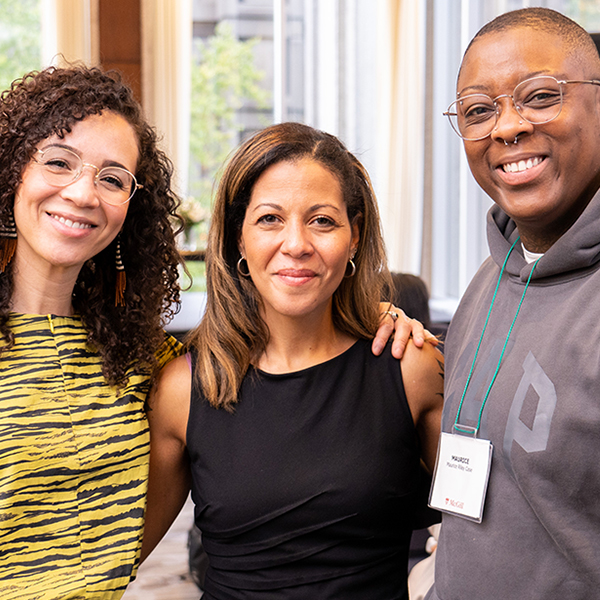Sandrine Ntibarigobeka, BA’16, forged strong friendships at McGill through the Black Students’ Network and the McGill African Students Society.
When she graduated and moved back to Ontario, “I wanted to continue and have that network in Toronto with fellow alumni,” says Ntibarigobeka.
So, she rolled up her sleeves as an alumna volunteer in 2016 and worked with fellow graduates to get the McGill Black Alumni Association (MBAA) off the ground.
Then, in 2020, as people around the globe protested against injustice and racism, she and other members of the MBAA’s leadership added their voices to help shape McGill’s new Action Plan to Address Anti-Black Racism 2020-2025.
Unveiled in Fall 2020, it outlines McGill’s commitment to an initial five years of concrete measures to enhance equity and inclusiveness for Black students, faculty, and staff, including efforts to increase their representation on campus. The University pledged at least $15 million during that timeframe.
The Dr. Kenneth Melville McGill Black Faculty Caucus, the MBAA, the Black Students’ Network, and the Joint Board of Governors and Senate Subcommittee on Racialized and Ethnic Persons were among those consulted for the plan. The MBAA took part in the town hall conversations and met with Principal Suzanne Fortier, Provost Christopher Manfredi and Associate Provost (Equity and Academic Policies) Angela Campbell “to propose our action plan and provide our recommendations,” says Ntibarigobeka.
Alumni are embedded in several outreach action items, including help with securing philanthropic funds to support underrepresented student demographic groups. The plan also commits to a fixed annual budget for the MBAA to develop a variety of outreach programs.
“We were really happy to be named in the plan and receive further institutional support for the MBAA’s future initiatives,” says Ntibarigobeka. They also liked the fact that the action plan not only addressed students and alumni, but also faculty and staff.
Mentorship, student representation – and wellness
The MBAA’s newest initiative, the McGill Black Mentorship Program, launched in January 2021 in a pilot phase. It pairs Black students at McGill with Black mentors from the ranks of alumni, faculty and staff.

“When we first started the MBAA, mentorship was really an important part of our mission,” Ntibarigobeka explains. The program is designed to connect Black students (undergraduate and graduate) with Black alumni, faculty, and staff in valuable partnerships.
“After we graduate, it’s easy to go our own ways and lose that connection with McGill and with the Black McGill community,” she says. “We are in diverse fields, different cities and career paths. We thought it was really a great program to facilitate those connections and create spaces where student mentees can feel comfortable connecting with someone that may have had shared experiences at McGill. This alumni mentorship network will also be an opportunity for students to explore a greater variety of professional pathways through exposure to Black professionals working in their fields of study or interest.”
Among the focal points for Black alumni during the consultation was a desire for increased student representation at McGill and the wellness of Black students on campus, according to Ntibarigobeka. “It’s important to have more Black students, but also while they’re at McGill, do they have the support to thrive and succeed,” she says.
“A focus on wellness is definitely one of the things that we were happy to see in the plan.”
McGill has committed to expanding supports for racialized students, including appointing at least one wellness advisor or counsellor in Student Services with expertise related to the psychological impacts of racism and naming a Black Student Affairs Liaison.
Celebrating diversity and hearing the voices that sometimes don’t get heard
The Board of the McGill Alumni Association (MAA) applauded the release of McGill’s Equity, Diversity & Inclusion Plan last spring and published its own statement in support of the University’s position on injustice and racism, and its commitment to address systemic racism. The MAA’s statement underlines the Board’s role in informing and involving alumni in matters of social importance and impact on campus.
“We were also pleased to see that the [action] plan has specific objectives that will be measurable,” says Inez Jabalpurwala, BA’89, MA’91, MBA’01, the MAA’s immediate past president and alumni representative on McGill’s Board of Governors. “Statements are important, but what is needed now are actions and accountability over the long term, so that change is meaningful and lasting.”
Since 2010, the MAA board has made a concerted effort to expand its pipeline for recruiting members to its board and committees and for identifying recipients of its annual Honours and Awards.
“Considering diversity in its fullest sense is central to this effort,” Jabalpurwala says, “and that means valuing different perspectives, experiences, identities and contributions to society.
The MAA board made equity, diversity and inclusion (EDI) a priority and key pillar in its strategic plan developed in 2018.
“EDI is integrated in the work of the MAA board because we recognize that we cannot represent the diversity of 275,000 alumni around the world and so we need to ensure that alumni have platforms to provide input to and have their voices heard by the University. These voices sometimes don’t get heard,” says Jabalpurwala. “We need to amplify diverse voices on campus and around the world, and reflect and value the diversity of the McGill experience.”
The board also conducted benchmarking of EDI practices at other universities in North America, reviewed McGill’s past work in this area, and ensured alignment with McGill’s plan.
The MAA’s current budget includes $25,000 to sponsor student and alumni branch initiatives. The board has pledged that at least 25 per cent of that envelope will be earmarked for anti-racism initiatives and initiatives that celebrate the presence and success of diverse communities.
For its part, the action plan calls for an extension of administrative support and budget for events such as Black Grad. Jabalpurwala recounted how the Black Students’ Network approached the MAA Board to explore potential funding sources for its inaugural Black Grad in 2019.
“The MAA can only provide funding for events and activities through our student sponsorship program, and there’s a cap on how much we can award to each successful applicant. We were disappointed that we could not contribute the full budget that was needed for the Black Grad. The University’s commitment to provide adequate funding for this event will ensure that the organizers do not have to rely on trying to cobble together money from different sources, and will also ensure the event’s continuity,” she says.
“Graduation celebrations are not one-size-fits-all,” adds Jabalpurwala. “And allowing the space for Black grads to organize a celebration that reflects their shared experiences is an important part of giving voice to different communities.”
An eye on future Black McGill students
The MBAA surveyed its members and is gathering their initial impressions of the action plan, which Ntibarigobeka called “a live, dynamic document.” The MBAA, as well as other groups, has ongoing communications with the University administration “as we kind of build the plan together,” she says.
Her contributions to its development, and the work the MBAA is undertaking to support its goals, are all done on a voluntary basis.
“It’s about supporting McGill Black alumni but also future students,” Ntibarigobeka says. “One of the key aspects of the plan and the MBAA’s recommendations is outreach. We want to emphasize the importance of increased recruitment of Black students, enhancing access and making McGill an inclusive place for future Black students going forward.
“So, it’s really important to engage CEGEP [Quebec college] students, high school students and demystify the McGill experience. I think students seeing representation in positions such as alumni, faculty, professors and staff will increase visibility and ultimately increase representativeness at the University.”


